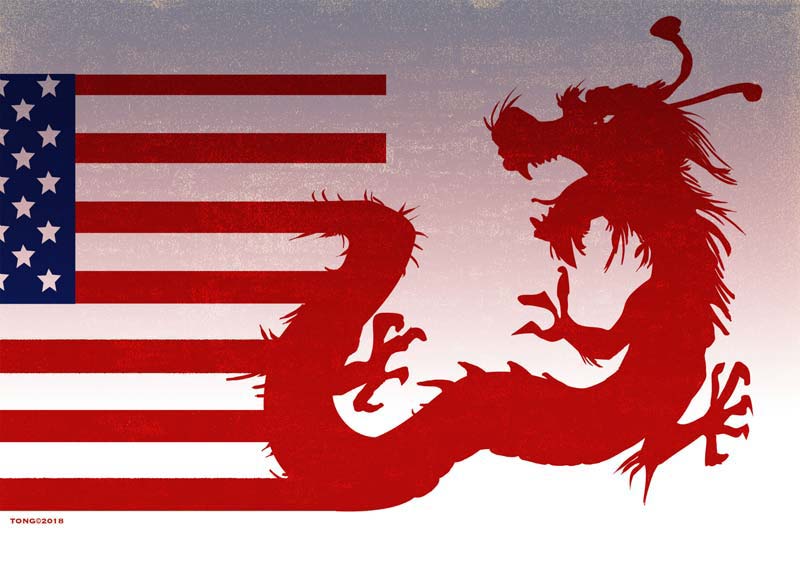
This war isn't yet being fought with weapons. Instead, it is a battle to control the world's most critical technology: the design and production of microchips — on which virtually everything in our modern world depends.
From microwaves to smartphones to cars, from the stock market to missiles — our economy and military run on the tiny silicon chips that power computer systems. "We rely on them for all aspects of our daily life," I was told by Chris Miller, author of the important new book "Chip War: The Fight for the World's Most Critical Technology." "Our society can't function without chips."
The United States used to be the global leader in designing and building the fastest chips, but its edge is slipping. China is investing billions in chip production for civilian and military uses in order to surpass us, while the Biden administration is moving to block Beijing's efforts. Meantime, the island of Taiwan — whose freedom Beijing constantly threatens — is the world's largest producer of the most advanced chips, which China would love to control.
So I recently did an InquirerLive video interview with Miller to discuss how the U.S.-China Chip War is likely to play out.
When the chip industry first developed in the 1960s and 1970s, it was located almost entirely in the United States. But over the last five decades, as chips grew more complex, countries began to specialize in separate parts of the chip-making process. "The U.S. remained the leader in designing and producing machine tools for making chips," Miller told me, "but when it comes to manufacturing chips, we have fallen behind."
In the early 1980s, Morris Chang, a Taiwanese American graduate of Stanford and MIT, was passed over as potential CEO at Texas Instruments — a snub that Miller called "one of the biggest business errors of the 20th century." Chang went on to accept an invitation from the Taiwanese government and established the Taiwan Semiconductor Manufacturing Co. (TSMC), which now manufactures 30% of the world's overall processor chips and 90% of the most advanced chips that power iPhones and computers.
The only companies potentially in position to compete with TSMC in chip manufacturing are South Korea's Samsung and the U.S. semiconductor company Intel. Russia isn't even in the game. China, still far behind in designing sophisticated chips, "has been spending more money on importing chips than importing oil," Miller said.
This poses a critical threat to future U.S. security. Modern warfare, Miller said, "will be more reliant than ever on chips." The military requires ever faster computing power for everything from autonomous (or unmanned) vehicles — such as drones and attack submarines — to radar systems, to communications and data processing, to other crucial systems.
"America is now betting the future of its military on a technology over which its dominance is slipping," Miller said. China and its army have been able to "buy foreign chipmakers, stealing their technology, and providing billions to subsidize Chinese chip firms and evade U.S. restrictions."
To thwart Beijing, the U.S. Commerce Department issued draconian export restrictions in October that block China from buying sensitive technologies for chip production, including advanced software and the machines needed to produce the chips. The Biden administration is also pressing reluctant allies, such as the Netherlands and Japan, not to sell China other key elements of the chip-making process. It is also discouraging Taiwan from selling advanced chips to Beijing.
Said Miller: "The Biden moves mean China will be unable to access the next generation of faster chips" that it needs for advances in artificial intelligence — including for its military.
Caught in the middle is Taiwan, whose biggest trading partner is China but which depends on Washington to prevent Beijing from seizing the island by force.
"The nightmare scenario," Miller said, "in terms of global economic impact, is if there would be a war in the Taiwan Straits. It is hard to think that chip production would not be affected, especially if production comes to a halt.
"Production of smartphones would be devastated, also PCs, data centers, cell phone towers" — along with cars and home appliances — and military operations. "There would be a massive long-term effect."
Aware of the danger, the Biden administration pushed through the CHIPS and Science Act that will provide $52 billion in support for semiconductor companies to build high-end chip fabrication plants in the United States. In addition, the Inflation Reduction Act provides huge amounts for innovative research.
And in a major win, the administration has persuaded Taiwan's TSMC to move some of its chip production to the United States, as a hedge against Chinese intervention. On Tuesday, TSMC announced it will substantially expand a small production plant it is already building in Phoenix, which will now produce chips more advanced than originally planned.
Clearly, TSMC is nervous about China's future moves.
But the Phoenix hub will make only a small dent in U.S. needs — and won't come on line until 2024 at the earliest. This leaves the United States still dependent on factories in Taipei.
Meanwhile, China's president, Xi Jinping, might get impatient and try to squeeze sophisticated chips out of Taiwan through economic or even risky military pressure. "Xi sees China's chip industry as vulnerable to the U.S., because his military systems are evermore dependent on sophisticated chips," Miller said. And Xi's attention is focused on "reunifying" Taiwan with the Chinese mainland.
This means that Americans should pay closer attention to the Chip War and its potential to spark a real war. These tiny silicon wafers, and who will control them, will shape the future of our computer-driven world.
(COMMENT, BELOW)
Trudy Rubin
Philadelphia Inquirer
(TNS)
Previously:
• 09/14/22: Ukraine scores sudden breakthrough that should energize Western support • 09/09/22: Queen Elizabeth's death deprives Britain and the world of a rock of stability • 09/08/22: After Gorbachev's death, Putin wants the world to know he is the 'anti-Gorbi'
• 08/26/22: 6 months after Russia's war vs. Ukraine began, the West still won't give Kiev the weapons to win
• 08/15/22: Ukraine's civilian volunteers work to give aid and rebuild, even as Russia continues to bomb them
• 08/08/22: A trip near the front lines finds Ukrainian troops ready for a battle that could decide the war
• 06/13/22: The critical battles for Ukraine and for America are being fought right here, right now
• 05/02/22: Save Odesa to save the world from hunger and high food prices
• 05/02/22: Bloodless Ukrainian War, not utopian fantasy says one-time largest foreign investor in Russia
• 04/11/22: The only way to end Putin's war crimes
• 03/28/22: Don't let Putin's nuclear and chemical threats stop us from giving Ukraine what it needs
• 03/24/22: An elegy for Mariupol, where I walked six weeks ago. Now razed by Russian bombs
• 03/18/22: Zelenskyy's brilliant speech should impel Biden and Congress to protect Ukrainian skies
• 03/11/22: Mariupol's bombed maternity hospital exemplifies why NATO should protect Ukraine's skies
• 03/10/22: No 'no-fly zone'? Then NATO must find another way to protect Ukraine's skies
• 03/07/22: The third World War has already started in Ukraine. Europe and the US should wake up
• 03/04/22:Putin must be stopped from turning Kiev into Aleppo
• 03/02/22:Why is Belarus helping Russia invade Ukraine? An explainer on the latest in the conflict
• 02/25/22: What the UN should finally do about Russia
• 02/24/22: Why Putin's Ukraine aggression will change the world --- an explainer on how we got here
• 02/10/22: Ukrainian civilians train for war with cardboard guns: 'We are scared but we are ready
• 01/13/22:Putin wants to reestablish the Russian empire. Can NATO stop him without war?
• 12/10/21: Can Biden and NATO prevent Putin from invading Ukraine? Summit puts it to the test
• 12/02/21: Boris Johnson stirs up new Irish Troubles for his own personal political gains
• 11/22/21: Xi Jinping thinks America is on the rocks. Is he correct?
• 08/18/21: President Biden, get our Afghan allies on evacuation planes
• 08/18/21:The horror of Afghan women abandoned by Biden's troop pullout
• 08/09/21:China is pushing a big COVID-19 lie that makes a new pandemic harder to prevent
• 05/27/21: Punish Belarus leader for Ryanair hijacking before air piracy becomes dictators' new tool
• 04/14/21: Can Beethoven temper the political tensions between US and China?
• 06/01/20: US must stand with Hong Kong against Beijing's efforts to crush its freedoms
• 05/20/20: COVID-19 offers a chance to halt Iran's hostage diplomacy
• 05/21/14: Newscycle spurs visit to country my family fled
• 04/21/14: Blind to Putin's strategy?
• 12/24/13: Obama's Syrian indifference has led to more death and destruction. Meet some real heroes
• 12/13/13: Where liberals have come to love the military
• 12/09/13: The China strategy
• 11/05/13: Return to Iraq is worth a close look
• 10/01/13: Obama's call to Iran: Who was really on the line?
• 09/11/13: How Obama got Syria so wrong
• 07/24/13: It's time for Obama to tell Putin 'nyet'
• 05/15/13: What Russia gave Kerry on Syria --- very little
Trudy Rubin is a columnist and editorial-board member for the Philadelphia Inquirer.


 Contact The Editor
Contact The Editor
 Articles By This Author
Articles By This Author